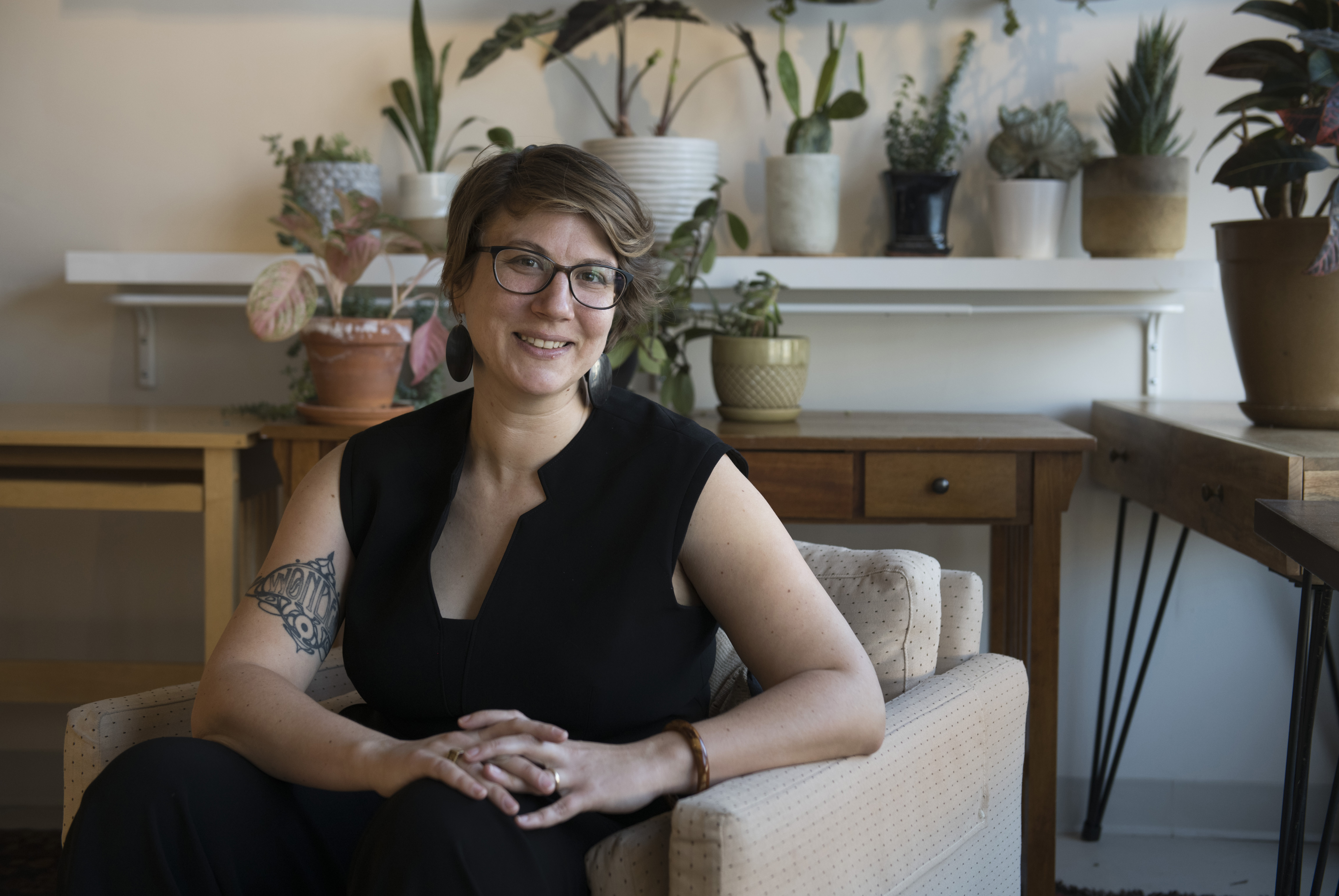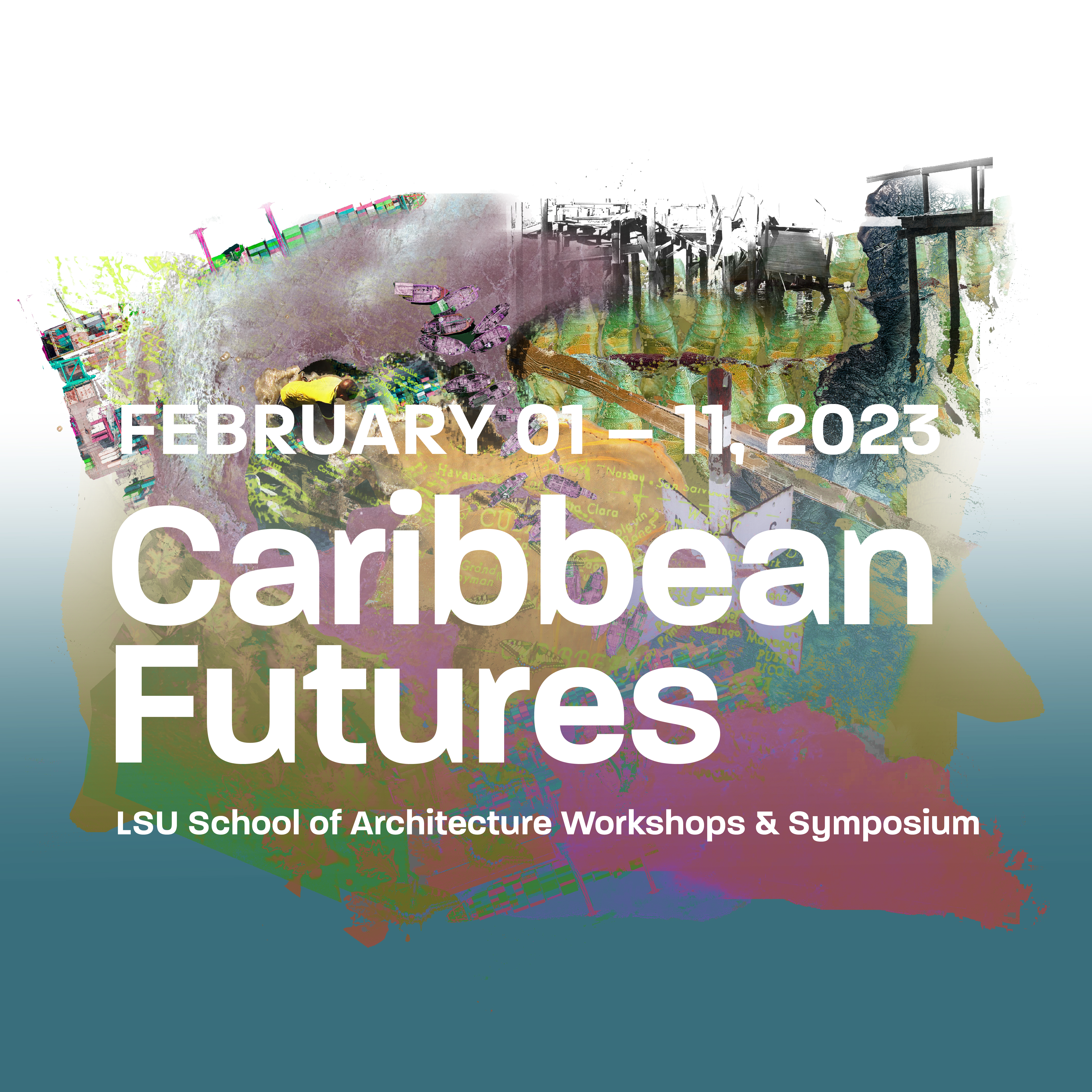
Irene Brisson is an architectural scholar and designer
invested in the study and
implementation of more inclusive and equitable design practices. They center historically marginalized narratives of architecture and building practices in Haiti and the greater Caribbean.
As an assistant professor of architecture at Louisiana State University, Irene teaches courses in design, research methodology, critical theory, and Afro-Caribbean architecture.
Their research on practices of communication in the design of Haitian residential architecture is based in ethnographic fieldwork with contractors, architects, and residents. Considering speech, gesture, drawing, and building as inclusive categories of communication, they examine how design interactions vary in complex relationships of class, education, language, race, and nationality to reproduce and challenge the status quo.
As an assistant professor of architecture at Louisiana State University, Irene teaches courses in design, research methodology, critical theory, and Afro-Caribbean architecture.
Their research on practices of communication in the design of Haitian residential architecture is based in ethnographic fieldwork with contractors, architects, and residents. Considering speech, gesture, drawing, and building as inclusive categories of communication, they examine how design interactions vary in complex relationships of class, education, language, race, and nationality to reproduce and challenge the status quo.
Irene’s other on-going research interests include the
intersections of the rhetorical and representational values of homes in popular culture, choreography in relationship to the built environment, community-based visual ethnography, and the politics of inclusion of people with marginalized gender, racial, and disabled identities in the built environment.
They hold a B.S. from the Massachusetts Institute of Technology, an M.Arch from Columbia University’s Graduate School of Architecture, Preservation & Planning, and a PhD in Architecture from the University of Michigan, Ann Arbor. Previously, Irene has taught at Bowling Green State University and Parsons the New School for Design.
email ︎︎ twitter ︎︎ louisiana state university ︎︎ CV ︎︎
They hold a B.S. from the Massachusetts Institute of Technology, an M.Arch from Columbia University’s Graduate School of Architecture, Preservation & Planning, and a PhD in Architecture from the University of Michigan, Ann Arbor. Previously, Irene has taught at Bowling Green State University and Parsons the New School for Design.
email ︎︎ twitter ︎︎ louisiana state university ︎︎ CV ︎︎
Recent Publications
Tracing a Plan in Kreyòl
Writer and literary critic Édouard Glissant described creolization as an open process with unfixed outcomes, characterized by a dialectic between oral and written discourses. Kreyòl architecture, like that of a house in Leyogàn, results from such a dialectic process. In the narrative to follow, dialogue and images are transmitted through the hand-drawn plan into a Kreyòl architecture resultant from transnational encounters of people, technology, and media.
Of Migration, CCA ︎︎
Writer and literary critic Édouard Glissant described creolization as an open process with unfixed outcomes, characterized by a dialectic between oral and written discourses. Kreyòl architecture, like that of a house in Leyogàn, results from such a dialectic process. In the narrative to follow, dialogue and images are transmitted through the hand-drawn plan into a Kreyòl architecture resultant from transnational encounters of people, technology, and media.
Of Migration, CCA ︎︎
Damage & Repair: Imagining collective dwelling in rural Haiti
In 1994 the Haitian urbanism research group Centre de recherches urbaines-travaux(CRUT) visualized a collective form to resist the oppressive structures of a neoliberal world order. The Workers Repatriation Center of Haiti (WRCH) proposed by CRUT centered the communal relationships between people and homeland, which are a profound aspect of Haitian identity demonstrated in the history of the lakou system.
In 1994 the Haitian urbanism research group Centre de recherches urbaines-travaux(CRUT) visualized a collective form to resist the oppressive structures of a neoliberal world order. The Workers Repatriation Center of Haiti (WRCH) proposed by CRUT centered the communal relationships between people and homeland, which are a profound aspect of Haitian identity demonstrated in the history of the lakou system.
Thresholds Journal ︎︎
Recent Events
February 8-11, 2023:
Caribbean Futures Workshop & Symposium (co-organizer)
![]()
The Caribbean Futures workshop and symposium gathered scholars, practitioners, and students, including the Nadine Carter Russell Chair, Sabine Malebranch, at the LSU School of Architecture to investigate and imagine actionable ideas to meet the challenges of escalating inequality and accelerating climate change in greater Caribbean, including the Gulf Coast.
Caribbean Futures Workshop & Symposium (co-organizer)

The Caribbean Futures workshop and symposium gathered scholars, practitioners, and students, including the Nadine Carter Russell Chair, Sabine Malebranch, at the LSU School of Architecture to investigate and imagine actionable ideas to meet the challenges of escalating inequality and accelerating climate change in greater Caribbean, including the Gulf Coast.
Caribbean Spatial Justice Lab︎︎
August 5, 2022:
Refleskyon sou istwa achitekti Ayisyen | Réflection sur l’histoire de l’architecture Haïtienne (speaker)
Public presentation at Centre International de Documentation et d'Information Haitienne,
Caribéenne et Afro-canadienne in Montreal and online for participants in Haiti on the emerging historiography of Haitian architecture including the introduction of materials uncovered during summer research.
Refleskyon sou istwa achitekti Ayisyen | Réflection sur l’histoire de l’architecture Haïtienne (speaker)
Public presentation at Centre International de Documentation et d'Information Haitienne,
Caribéenne et Afro-canadienne in Montreal and online for participants in Haiti on the emerging historiography of Haitian architecture including the introduction of materials uncovered during summer research.
CIDIHCA︎︎
August 4, 2022:
Lakay se Lakay: Transnational Architectures of Belonging (speaker)
Public presentation of preliminary findings as a CCA Research Fellow. As a fellow, conducted research exploring the intimate construction—physical and conceptual—of domestic environments in Haiti and among the Haitian diaspora through the frame of lakay as a discursive and conditional index of belonging based in the relationships between people, place, and memory.
CCA︎︎
Lakay se Lakay: Transnational Architectures of Belonging (speaker)
Public presentation of preliminary findings as a CCA Research Fellow. As a fellow, conducted research exploring the intimate construction—physical and conceptual—of domestic environments in Haiti and among the Haitian diaspora through the frame of lakay as a discursive and conditional index of belonging based in the relationships between people, place, and memory.
CCA︎︎
September 24, 2021:
Translating Haiti: On the Academic Job Market (moderator)
The second event in the Emerging Scholars’ Translating Haiti mentorship series, this event featured a conversation among recently hired scholars from various disciplines and backgrounds discussing how they translated their Haitian studies research for the job market.
Translating Haiti: On the Academic Job Market (moderator)
The second event in the Emerging Scholars’ Translating Haiti mentorship series, this event featured a conversation among recently hired scholars from various disciplines and backgrounds discussing how they translated their Haitian studies research for the job market.
HSA︎︎
April 14, 2021:
Rasanblaj as Methodology: Investigating Kreyòl architectures (speaker)
On the “Rethinking Evidence” panel at the Society for Architectural Historians virtual conference, presented a paper reflecting on the implications and challenges of using rasanblaj as a methodology for researching the social practice of architecture.
SAH Conference︎︎
Rasanblaj as Methodology: Investigating Kreyòl architectures (speaker)
On the “Rethinking Evidence” panel at the Society for Architectural Historians virtual conference, presented a paper reflecting on the implications and challenges of using rasanblaj as a methodology for researching the social practice of architecture.
SAH Conference︎︎